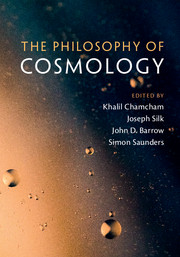Book contents
- Frontmatter
- Contents
- List of Contributors
- Preface
- Acknowledgments
- Part I Issues in the Philosophy of Cosmology
- Part II Structures in the Universe and the Structure of Modern Cosmology
- Part III Foundations of Cosmology: Gravity and the Quantum
- Part IV Quantum Foundations and Quantum Gravity
- Part V Methodological and Philosophical Issues
- 19 Limits of Time in Cosmology
- 20 Self-Locating Priors and Cosmological Measures
- 21 On Probability and Cosmology: Inference Beyond Data?
- 22 Testing the Multiverse: Bayes, Fine-Tuning and Typicality
- 23 A New Perspective on Einstein's Philosophy of Cosmology
- 24 The Nature of the Past Hypothesis
- 25 Big and Small
- Index
- References
25 - Big and Small
from Part V - Methodological and Philosophical Issues
Published online by Cambridge University Press: 18 April 2017
- Frontmatter
- Contents
- List of Contributors
- Preface
- Acknowledgments
- Part I Issues in the Philosophy of Cosmology
- Part II Structures in the Universe and the Structure of Modern Cosmology
- Part III Foundations of Cosmology: Gravity and the Quantum
- Part IV Quantum Foundations and Quantum Gravity
- Part V Methodological and Philosophical Issues
- 19 Limits of Time in Cosmology
- 20 Self-Locating Priors and Cosmological Measures
- 21 On Probability and Cosmology: Inference Beyond Data?
- 22 Testing the Multiverse: Bayes, Fine-Tuning and Typicality
- 23 A New Perspective on Einstein's Philosophy of Cosmology
- 24 The Nature of the Past Hypothesis
- 25 Big and Small
- Index
- References
Summary
Our everyday macroscopic experience of being in the world is saturated with asymmetries – thermodynamic asymmetries, and radiative asymmetries, and epistemic asymmetries, and phenomenological asymmetries, and asymmetries of over-determination, and asymmetries of influence, and what have you – between the past and the future.
And there is a long-cherished hope – something that has its origins in the work of Boltzmann, and which has been pursued, by any number of other investigators, through any number of fits and starts and revelations and wrong turns, ever since – that all of those asymmetries can ultimately be traced back to some relatively simple characteristic of the initial macrocondition of the universe. The thought (as people put it now) is that all we need to do, in order to account for these asymmetries, is to add to the fundamental time-reversalsymmetric dynamical laws, and to the standard statistical-mechanical probability-measure over the space of possible fundamental physical states, a simple postulate – a so-called past-hypothesis – to the effect that the world first came into being in whatever particular low-entropy macrocondition it is that the normal inferential procedures of cosmology are eventually going to present to us.
The business of working this thought out in detail is a large undertaking, which is still very much in its infancy, and which is still very much under debate – and I do not want to attempt anything along the lines of an overview of that project here. All I want to talk about in this chapter is a widespread and fundamental and perennial sort of puzzlement about how such a project could even seriously be entertained – a puzzlement (that is) about how it is that the macrocondition of the universe 14 billion years ago – all by itself – could even imaginably be up to the job of explaining so much about the feel, now and on earth, of the passing of time.
This puzzlement takes a number of different forms, and arises in a number of different contexts.
On the most trivial level, there is a question of how the lowness of the entropy of the world 14 billion years ago can impose any genuinely profound and vivid constraints whatever on what the world is doing now.
- Type
- Chapter
- Information
- The Philosophy of Cosmology , pp. 500 - 504Publisher: Cambridge University PressPrint publication year: 2017



